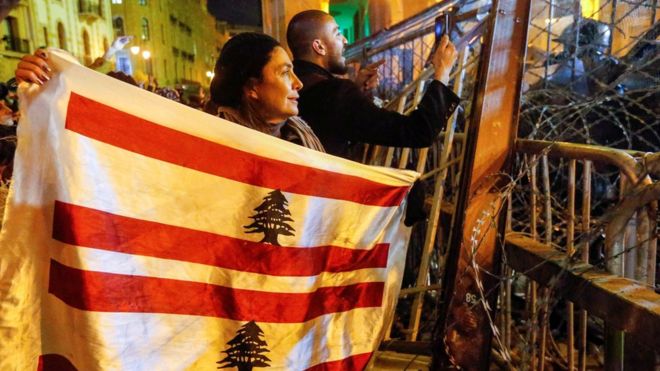Lebanon ended a painful wait Tuesday by unveiling a new cabinet line-up, but the government was promptly scorned by protesters and faces the Herculean task of saving a collapsing economy.

More than a month after he was designated with backing from the powerful Shiite movement Hezbollah and nearly three after his predecessor Saad Hariri resigned under pressure from the street, Prime Minister Hassan Diab’s cabinet of 20 ministers was announced.
The academic and former education minister, who was little-known in Lebanon until last month, insisted in his first comments as premier that his cabinet was a technocratic one that would strive to meet protesters’ demands.
“This is a government that represents the aspirations of the demonstrators who have been mobilised nationwide for more than three months,” he said.
He said his government “will strive to meet their demands for an independent judiciary, for the recovery of embezzled funds, for the fight against illegal gains.”
The new cabinet is made up of little-known figures, many of them academics and former advisers, but protesters were quick to argue that the absence of the biggest names in Lebanon’s widely reviled hereditary political elite was but a smokescreen.
Groups of demonstrators had gathered in the streets of Beirut before the cabinet was even unveiled, blocking off a main street in the centre of the capital where violent scuffles with the police left dozens wounded over the weekend.
‘Not serious’
“We want a new Lebanon, a Lebanon with no corruption,” Charbel Kahi, a 37-year-old farmer, told AFP as fellow protesters beat drums behind him.
“They are not taking the Lebanese people seriously with this government,” he said.
Hilal Khashan, a professor at the American University of Beirut, argued that the idea of a genuinely technocratic government in Lebanon was “wishful thinking”.
“Behind every candidate, there is a political party backing their nomination,” he said.
Paula Yacoubian, a former journalist and independent MP, scorned the new line-up as “patches on old clothes”.
She posted a picture of a beat-up car with flaking paint and a caption that read: “There’s a disagreement over who will be driving (and) who will have a seat by the window.”
“Hassan Diab did not keep his promise of forming a government of independent” experts, she said.
Diab, a 61-year-old engineering professor at the American University of Beirut and self-professed technocrat, had been stuck between a political rock and an economic hard place.
Every day that passed without a cabinet had fuelled the anger of protesters and tested the patience of foreign donors warning that the quasi-bankrupt state could ill afford further delays.
Mission impossible?
Donors and citizens are pinning their hopes on a new government to spearhead reforms, unlock billions in international aid and help stabilise a plummeting currency.
But analysts argue that there is little Hassan Diab’s new government can do.
“The task that awaits any cabinet during this serious period is Herculean,” said Karim Mufti, a political scientist.
“In view of the multidimensional nature of the crisis, it seems difficult to envisage short-term solutions to the country’s financial, economic and social problems.”
A grinding dollar liquidity crisis and informal caps on withdrawals of the greenback have compounded the crisis, leaving Lebanon on the brink of default.
The outgoing government included all of Lebanon’s political factions, but Hariri’s Sunni-dominated movement and some of his allies have opted to stay out of the new cabinet.
This leaves the small country of six million led by a government dominated by the sanctions-hit Hezbollah movement and its allies.
Both the Christian bloc of President Michel Aoun and the Shiite Amal party of Parliament Speaker Nabih Berri are political allies of the Iran-backed organisation.
Observers have warned that such a lopsided government could struggle to foster enough goodwill at home and abroad to implement much-needed reforms.
Shortly before the Cabinet was announced Tuesday night, the Syndicate of Money Changers in Lebanon issued a statement saying it had agreed to set the exchange rate at a maximum of 2,000 Lebanese pounds to the dollar, after it reached 2,500 pounds to the dollar last week. The official price still stands at 1,507 to the dollar.
Below is the government’s line-up as announced by the secretary-general of the Council of Ministers.
Diab has pledged to form a small Cabinet made up of “independent experts” who are not affiliated with any political parties as demanded by the hundreds of thousands of protesters who have taken to the streets since Oct. 17, calling for a change of the sectarian ruling system, fighting corruption, and the removal of the entire political class they deem corrupt and incompetent.
But every one of the ministers was named by Hezbollah or one of the parties or politicians that are loyal to it . It is a one sided cabinet
Prime Minister: Hassan Diab (Sunni)
Deputy PM and Defense: Zeina Akar (Greek Orthodox, named by President/FPM)
Finance: Ghazi Wazni (Shiite, named by AMAL Movement)
Interior: Mohammed Fahmi (Sunni, named by Diab)
Foreign : Nassif Hitti (Maronite, named by President/FPM)
Telecom: Talal Hawat (Sunni, close to MP Faisal Karami)
Health: Hamad Hasan (Shiite, named by Hezbollah)
Energy: Raymond Ghajar (Greek Orthodox, named by President/FPM)
Public Works: Michel Najjar (Greek Orthodox, named by Marada Movement)
Information: Manal Abdul Samad (Druze) named by Arslan FPM
Minister of the Displaced: Ghada Shreim
Justice: Marie-Claude Najem (Maronite, named by President/FPM)
Tourism and Social Affairs: Ramzi Msharrafiyeh (Druze) named by FPM , Arslan
Education: Tarek al-Majzoub (Sunni, named by Diab)
Industry: Imad Hoballah (Shiite, named by Hezbollah)
Labor: Lamia Yammine (Maronite, named by Marada)
Environment and Administrative Development: Demianos Qattar (Maronite, named by Diab)
Economy: Raoul Nehme (Named by President/FPM)
Youth and Sport: Vartineh Ohanian (Armenian) Tashnaq party
Agriculture and Culture: Abbas Murtada (Shiite, named by AMAL)
(AFP)/FRANCE24 / YL

Leave a Reply
You must be logged in to post a comment.